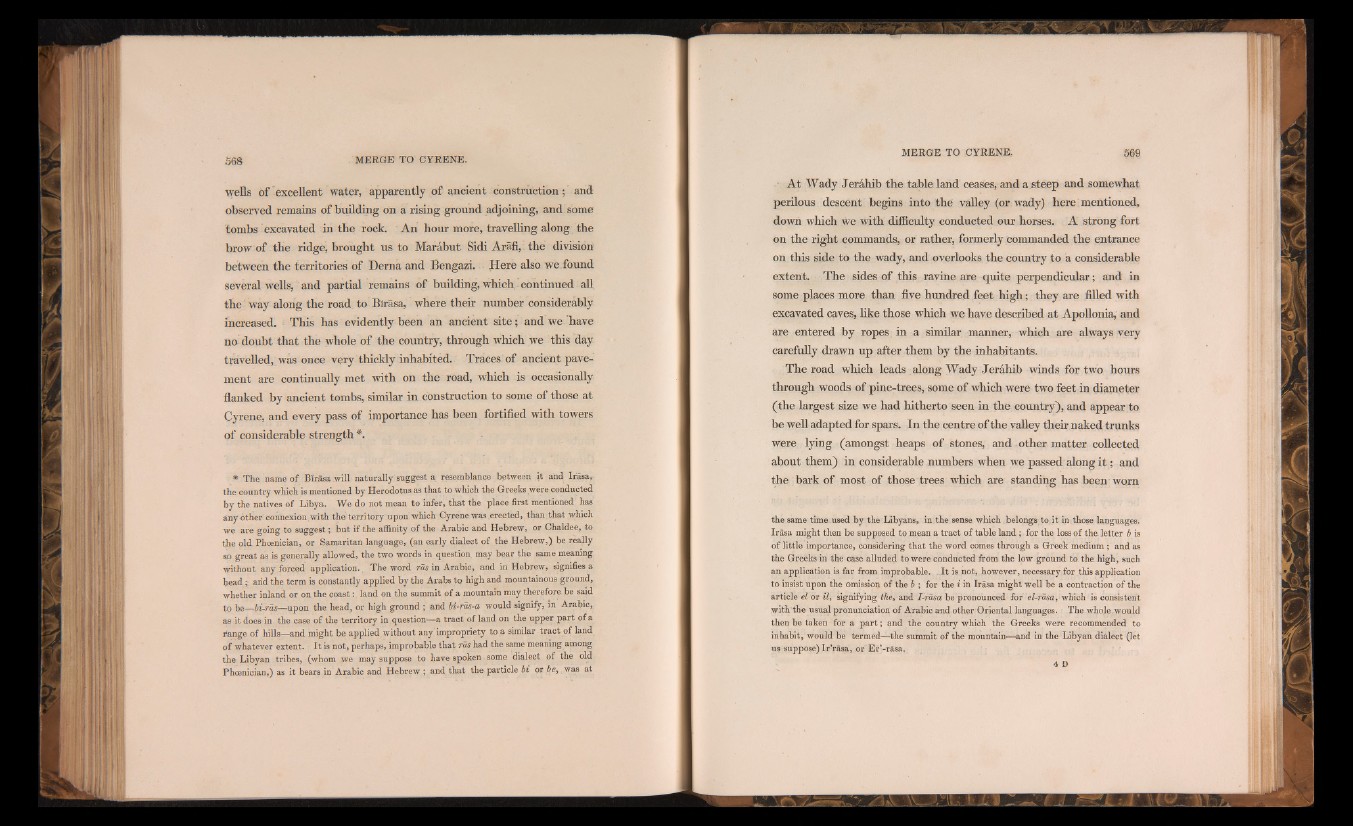
wells of excellent water, apparently of ancient construction; and
observed remains of building on a rising ground adjoining, and some
tombs excavated in the rock. An hour more, travelling along the
brow of the ridge, brought us to Marábut Sidi Aráfi, the division
between the territories of Derna and Bengazi. Here also we found
several wells, and partial remains of building, which, continued all
the way along the road to Blrasa, where their number considerably
increased. This has evidently been an ancient site; and we. have
no doubt that the whole of the country, through which we this day
travelled, was once very thickly inhabited. Traces of ancient pavement
are continually met with on the road, which is occasionally
flanked by ancient tombs, similar in construction to some of those at
Cyrene, and every pass of importance has been fortified with towers
of considerable strength *.
* The name of Birasa will naturally suggest a resemblance between it and Irasa,
the country which is mentioned by Herodotus as th a t to which the Greeks were conducted
by the natives of Libya. We do not mean to infer, that the place first mentioned has
anyóther connexion .with the territory upon which Cyrene was erected, than.that which
we are going to suggest; but if the affinity of the Arabic and Hebrew, or Chaldee, to
the old Phoenician, or Samaritan language, (an early dialeet of the Hebrew,) be really
so great as is generally allowed, the two words in question may bear the same meaning
without any forced application. The word roa in Arabic, and in Hebrew, signifies a
h e ad ; arid the term is constantly applied by the Arabs to high and mountainous ground,
whether inland or on the coast: land on the summit of a mountain may therefore be said
to be—bi-Tas—upon the head, or high ground ; and bi-ras-a would signify, in Arabic,,
as it does-in the case of the territory in.question—a tract of land on the upper p a rt of a
range of hills—and might be applied without any impropriety to a similar tra c t of land
o f whatever extent. I t is not, perhaps, improbable tha t ras had the same meaning among
the Libyan tribes, (whom we may suppose to have spoken some dialect of the old.
Phoenician,) as it bears in Arabic and Hebrew ; and tha t the particle b i or be, was at
At Wady Jer&hjb the table land ceases, and a steep and somewhat
perilous descent begins into the valley (or wady) here mentioned,
down which we with difficulty conducted our horses. A strong fort
on the right commands, or rather, formerly commanded the entrance
on this side to the wady, and overlooks the country to a considerable
extent. The sides of this ravine are quite perpendicular; and in
some places more than five hundred feet high ; they are filled with
excavated caves, like those which we have described at Apollonia, and
are entered by ropes in a similar manner, which are always very
carefully drawn up after them by the inhabitants.
The road which leads along Wady Jer&hib winds for two hours
through woods of pine-trees, some of which were two feet in diameter
(the largest size we had hitherto seen in the country), and appear to
be well adapted for spars. In the centre of the valley their naked trunks
were lying (amongst heaps of stones, and other matter collected
about them) in considerable numbers when we passed along i t ; and
the bark of most of those trees which are standing has been worn
the same time , used by the Libyans, in the sense which belongs to it in those languages.
Irasa might then be supposed to mean a tract of table land ; for the loss of the letter b is
of little importance, considering that the word comes through a Greek medium ; and as
the Greeks in the case alluded to were conducted from the low ground to the high, such
an application is far from improbable. . I t is not, however, necessary for this application
to insist upon the omission of the b ; for the i in Irasa might well be a contraction of the
article el or il, signifying the, and I-rasa be pronounced for el-rasa, which is consistent
with the usual pronunciation of Arabic and other'Oriental languages. The whole,would
then be taken for a p a r t ; and the country which the Greeks were recommended to
inhabit, would be termed—the summit of the mountain—and in the Libyan dialect (let
us suppose) I r ’rasa, or E r ’-rasa.